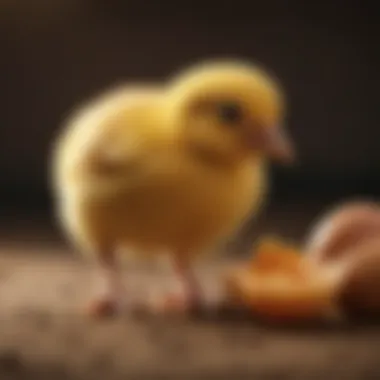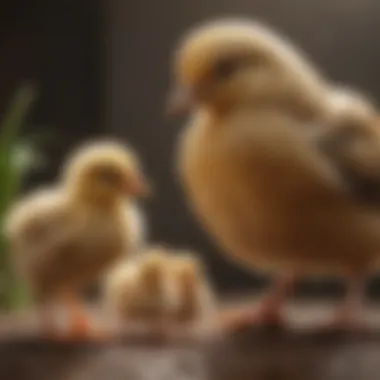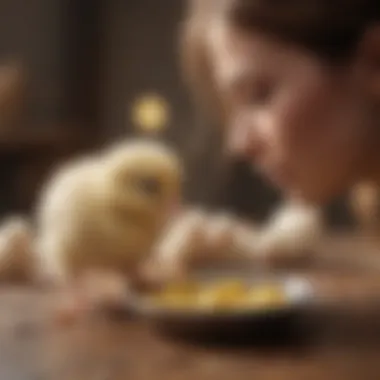Essential Duration and Considerations for Chick Starter Feed


Intro
Feeding chicks the right starter feed is crucial for their health and growth. The early stages of a chick's life are formative and set the tone for their future health and productivity. Understanding the duration of the starter feed phase and its nutritional requirements ensures caregivers provide optimal support during this critical development period.
Duration of Starter Feed for Chicks
Typically, chicks should be fed starter feed for the first six to eight weeks of their lives. This period provides essential nutrients needed for rapid growth. The decision on how long to continue feeding starter feed can depend on several factors, including breed, health, and growth rate.
"Feeding chicks the right nutrition in the first weeks will lead to healthier adult birds."
The protein content in starter feed usually ranges from 18% to 24%. This high-protein content supports muscle development and overall chick vigor. It's important to evaluate individual development and adjust feeding schedules accordingly.
Factors Influencing Duration
- Breed of Chick: Different breeds have different growth rates and nutritional needs. For instance, broilers may require shorter feeding times than layers.
- Health Status: Chicks with health issues might need extended time on starter feed to build strength.
- Initial Size and Weight: Some chicks may start off smaller and require additional time on starter feed to catch up with their peers.
Nutritional Needs During Starter Phase
Proper nutrition is the foundation for chick health. Starter feed formulations must meet specific criteria:
- Balanced Protein: Ensures growth and development in muscle and tissues.
- Essential Vitamins and Minerals: Support immune function and development, including calcium for bone health.
- Digestible Energy Sources: Provides energy required for daily activities and growth.
Transitioning to Grower Feed
After about six to eight weeks, chicks should transition to grower feed. This feed is typically lower in protein and formulated to support ongoing development without encouraging excessive weight gain.
- Monitor Growth Rates: Assessment of growth during the starter phase informs the right time to transition to grower feed.
- Gradual Changes: Slowly mix starter and grower feeds to help chicks adjust to the new diet.
- Adjust for Individual Needs: Some chicks may need more time on starter feed before transitioning.
Epilogue
Feeding chicks the right starter feed for the appropriate duration is essential for their long-term health and productivity. Caregivers must consider breed, health, and individual needs while monitoring growth closely. By ensuring that chicks receive adequate nutrition during this critical phase, one sets the stage for their successful development into healthy adult birds.
Understanding Starter Feed
Chicks require specific nutritional support in their early stages of growth. Understanding starter feed is crucial, as it lays the groundwork for their overall health and development. This section will explore the definition and purpose of starter feed, as well as its nutritional composition to ensure that these young birds thrive.
Definition and Purpose
Starter feed is a specialized type of poultry feed formulated to meet the unique nutritional requirements of chicks from the day they hatch until they reach a specific age. This feed is designed to promote rapid growth and development, providing essential nutrients that support healthy bone formation, muscle development, and overall health.
The primary purpose of starter feed is to deliver adequate levels of proteins, vitamins, and minerals. Since chicks have high energy needs, starer feed typically has higher protein content compared to adult feeds. This ensures that the chicks can meet their growth demands while also supporting their developing immune systems and organs.
In addition to its nutritional profile, starter feed also plays a vital role in the social and behavioral development of chicks. Access to a consistent and quality diet encourages normal pecking behavior, which is crucial as they mature.
Nutritional Composition
The nutritional composition of starter feed is meticulously crafted to support the rapid growth of chicks. Generally, starter feeds contain around 18% to 24% protein, derived from both plant and animal sources. This elevated protein level is key to enabling optimal muscle and tissue formation.
Other important nutrients include:
- Vitamins: Essential for various metabolic processes, vitamins A, D, and E are crucial for immune response and vision.
- Minerals: Calcium and phosphorus are fundamental for bone development. A ratio of these minerals is essential for proper skeletal growth.
- Fats: Healthy fats provide energy and support growth but must be balanced to prevent obesity in chicks.
- Carbohydrates: Serve as the main energy source and should comprise a significant portion of the diet to sustain energetic activities.


Moreover, starter feeds often contain probiotics and prebiotics to promote gut health, which is vital for digestion and nutrient absorption.
High-quality starter feed ensures chicks develop strong foundations for later stages of growth.
In summary, understanding starter feed is essential for anyone involved in chick care. The right formulation not only promotes rapid growth but also aligns with the chicks' developmental needs, setting the stage for a healthy life.
Optimal Duration for Starter Feed
The duration for which chicks should receive starter feed is crucial for optimal growth and development. Nutritional needs change as chicks grow, and understanding the timing of these transitions can lead to healthier outcomes. The starter feed phase is vital; it provides the essential nutrients required during early life stages. It is not only about the types of feed used, but also about the timing and duration.
General Guidelines
When it comes to feeding chicks, there are some general guidelines to follow. Starter feed is typically given for the first few weeks of a chick's life, but the exact duration can vary based on multiple factors. It is important to assess the individual needs of your chicks. Common recommendations suggest that starter feed should be fed until chicks are about three to four weeks old.
Additionally, the consistency and quality of the feed should be regularly evaluated. Optimal feeding includes maintaining a fresh supply of starter feed and ensuring that chicks have access to clean water at all times.
Age Considerations
Days One to Seven
During the first week, chicks are highly vulnerable and need precise nutrition. The starter feed during this phase is high in protein and energy, essential for the rapid growth occurring in these early days. This age is marked by the development of vital organs and systems within the chick's body.
The key characteristic of this stage is the need for very high protein content, often around 20-24%. This level of nutrition supports initial development effectively. However, over-reliance on only starter feed may lead to a lack of variety in their diet later on.
Days Eight to Fourteen
The second week continues to see rapid growth, but chicks begin to show signs of becoming more active and engaging with their surroundings. It is a beneficial time to maintain their starter diet while watching out for their individual growth rates.
The ideal characteristic of this stage is that chicks remain in a fast-growing phase, requiring constant access to starter feed. The unique feature of this age range is visible physical changes; chicks become more social and active. However, careful monitoring of their weight gain is essential to prevent any underperformance.
Days Fifteen to Thirty
As chicks approach the third week, their nutritional needs commence to transition. They still require the nutrient-rich starter feed but may begin to graze on other food types. Encouraging exploration helps them adapt better.
The key characteristic here is the gradual introduction of grower feeds in conjunction with the starter feed. This blend helps prepare their digestive systems for more complex nutrients. One disadvantage could be potential digestive issues if the transition is made too quickly. Therefore, maintaining balance in their diet is crucial.
Factors Influencing Duration
The duration for which chicks should remain on starter feed does not solely depend on a fixed timeline. Various factors play a crucial role in determining the optimal length of this feeding phase. Understanding these specific elements is vital for ensuring the health and growth of chicks. Each factor interrelates, creating a complex tapestry of requirements.
Breed Specific Needs
Different chicken breeds exhibit distinct nutritional requirements that affect how long they need starter feed. For instance, fast-growing breeds like Broilers require a higher protein intake for rapid development. They may benefit from starter feed for a shorter time compared to slower-growing breeds, such as Heritage chickens, which might need longer to fully utilize the nutrients.
Recognizing the specific needs of a breed helps in providing an adequate supply of essential nutrients. This ensures that the chicks do not experience nutritional deficits, which can impact their overall health. Maintaining awareness of breed-specific feeding practices is crucial in making informed decisions.
Environmental Conditions
Environmental factors significantly influence how chicks utilize their starter feed. Temperature, humidity, and space availability can all dictate growth rates and, consequently, the duration of the starter feed phase. In overly cold conditions, chicks might require more energy to maintain body heat, leading to a higher nutritional intake than in a stable environment.
Additionally, crowded living conditions can result in increased stress levels among the chicks, affecting their appetite and growth potential. A consistent and favorable environment promotes proper feeding and growth, which is essential for determining when to transition to grower feed.


Health and Developmental Status
Chick health is another pivotal element when considering the duration for feeding starter feed. Healthy chicks with few health issues can typically grow faster than those with health problems. Diseases or infections can delay growth rates and increase the nutritional needs of affected chicks. Therefore, regular monitoring of health status is vital to ensure they are receiving appropriate nutrition.
Moreover, developmental milestones also vary among individual chicks. Some may reach the point for transition to grower feed earlier than others based on their unique growth patterns.
Regular health checks and monitoring growth can help determine the right time to transition out of starter feed.
Ultimately, health and growth must be watched closely to make informed decisions on when to shift feeding strategies. The careful consideration of these influencing factors ensures chicks receive the best possible care during their critical early growth stages.
Transitioning from Starter Feed
Transitioning from starter feed to grower feed is a critical phase in a chick's development. This period is essential to ensure chicks receive the appropriate nutrients they need as they grow. Transitioning too early or too late can lead to various problems that can impact their overall health. Understanding when and how to make this shift can enhance growth rates and improve the well-being of the chicks. The right timing and feed composition can contribute significantly to their long-term health and production potential.
Signs That it's Time to Transition
Recognizing when to switch from starter feed is vital for the health of the chicks. Here are some indicators:
- Age Milestone: Generally, chicks can begin transitioning around three to four weeks of age. At this time, they will have used the essential nutrients from starter feed efficiently.
- Physical Growth: Observe the chicks’ physical growth. If they have reached the appropriate size for their breed, it may be time to introduce grower feed.
- Feeding Behavior: If the chicks are eating more feed than before and seem to be less interested in their starter feed, this can signal readiness for a change. They often exhibit an increase in appetite as they grow.
- Health Conditions: A healthy feathering process is another indicator. If the chicks are starting to exhibit adult-like feathers, this may also suggest it is time to transition.
Being attuned to these signs will help in making a beneficial transition that supports the continued growth and health of the chicks.
Choosing the Right Grower Feed
Selecting the correct grower feed is critical for nurturing chicks as they move into later developmental stages. The ideal grower feed should focus on several key elements:
- Protein Content: The grower feed should contain a protein level ranging from 16% to 20%. This is crucial for muscle development and overall growth.
- Balanced Nutrients: Look for a feed that provides a balance of vitamins and minerals. Specifically, calcium and phosphorus are important for bone development as chicks grow.
- Fiber Levels: A good grower feed should have appropriate fiber content that aids in digestion. This balance will promote healthier gut bacteria, which aids in nutrient absorption.
- Brand Reputation: Choose products from reputable companies known for their quality control. Brands like Purina and Nutrena offer specific grower feeds designed for various breeds and age groups.
Once you’ve identified the right product, transitioning should be gradual. Mix both starter and grower feeds to ease the change, helping chicks adapt without digestive issues.
Potential Issues with Timing
Understanding the implications of timing related to feeding chicks starter feed is critical. The developmental stages in chicks are finely tuned to their nutritional intake. If birds remain in starter feed too long or transition to grower feed too quickly, several issues can arise. These problems may affect growth rates and overall health, potentially leading to long-term complications.
Overstaying in Starter Feed
Nutritional Deficiencies
An important aspect of overstaying in starter feed is nutritional deficiencies. Starter feed is formulated to meet the specific needs of young chicks. However, if chicks remain on this feed beyond the recommended duration, they may miss out on essential nutrients found in grower formulations.
The key characteristic of this deficiency is a lack of balance among proteins, vitamins, and minerals necessary for proper development. This is a significant choice for this article because understanding these deficiencies can guide caretakers in making informed decisions about their chicks' diet.
A unique feature of nutritional deficiencies is that they can manifest in various ways, such as feather loss, poor weight gain, or weakened immune systems. Each of these factors has disadvantages. They reflect neglect in dietary management and can lead to expensive veterinary care later.
Growth Stunting
Another critical consequence of overstaying in starter feed is growth stunting. This condition occurs when chicks do not receive the necessary nutrients for optimal growth rates over a prolonged period.
The primary concern with growth stunting is that it permanently affects the potential size and productivity of the birds. This makes it a crucial topic in the article. Identifying this issue early allows caretakers to adjust feeding practices and prevent lasting harm to flock development.
The unique aspect of growth stunting is that it may not be immediately obvious. It develops gradually, leading owners to believe their chicks are simply growing slowly but failing to realize the consequences. The advantage of the information presented here is that it empowers caregivers to act proactively.


Rushing Transition to Grower Feed
Digestive Issues
Transitioning from starter feed too quickly can result in digestive issues. Young chicks have digestive systems that require time to adapt to increasingly complex diets. This process can be disrupted if the transition is rushed, leading to various gastrointestinal problems.
Digestive issues manifest themselves as diarrhea, poor nutrient absorption, and overall discomfort. Recognizing this is beneficial for the article's audience, as it places emphasis on the importance of gradual dietary changes.
One unique feature of digestive issues is their potential to create a vicious cycle. Poor digestion can lead to further health problems, which may necessitate higher veterinary intervention costs. Identifying and managing these issues early provides significant long-term benefits for everyone involved.
Compromised Health
Finally, rushing the transition to grower feed can lead to compromised health. When chicks are provided with inappropriate feed too early, their immune systems may not develop as intended. This foregone conclusion can have serious repercussions for overall flock health.
The key characteristic of compromised health is the increased susceptibility to diseases and infections that otherwise could be avoided with proper nutrition. This is an essential aspect of this article because it emphasizes the delicate balance needed in managing chick diets.
One unique feature of compromised health is its long-lasting effects. Illness in early stages of life can overshadow a chicken's later productivity and vitality. Understanding this fact allows caretakers to implement better dietary timing and enhance their flock's chances for successful, healthy lives.
Expert Insights and Recommendations
Understanding the nuances of chick nutrition necessitates insights from reputable sources. Both veterinarians and nutritional experts offer invaluable recommendations for optimizing the duration of starter feed for chicks. Tapping into their collective knowledge can help caretakers make informed decisions about their birds’ dietary needs. This section highlights key elements, benefits, and considerations surrounding professional guidance in chick feeding.
Advice from Veterinarians
Veterinarians, with their extensive training, are often attuned to the physiological requirements of young poultry. Their advice primarily revolves around the signs of health and development. For instance, they may recommend monitoring growth rates and behaviors to determine if the chicks show signs of thriving or not.
Key considerations veterinarians emphasize include:
- Behavioral Observations: Chicks should be active and engaged. Lack of activity can indicate nutritional deficiencies or health issues.
- Weight Monitoring: Regular weighing helps track growth against established benchmarks. Deviations may require adjustments in feeding schedules or diet formulations.
- Clinical Signs: Any indications of disease, such as lethargy or refusal to eat, should lead to prompt veterinary consultation.
The advice from veterinarians serves as an essential foundation on which to build a responsible feeding regime. They provide not only guidance on duration but also insight into specific health challenges that might arise in the early stages of chick development.
Nutritional Experts' Perspectives
Nutritional experts bring a scientific approach to chick feeding. They analyze feed composition and tailor dietary recommendations based on chick maturity and individual nutritional needs. Their insights focus on essential nutrients that support growth.
Elements that nutritional experts might focus on include:
- Protein Levels: High protein content is crucial during the initial weeks to promote muscle development and overall health.
- Vitamins and Minerals: Adequacy of vitamins like A, D, and E, alongside essential minerals, can significantly impact the immune system and bone growth.
- Energy Sources: Carbohydrates are vital for providing the energy necessary for active growth and metabolism.
Experts recommend closely following manufacturer’s guidelines for starter feeds. These guidelines are often based on extensive research and are designed to provide a balanced and complete nutrition profile for growing chicks.
Ending
The final segment of this article addresses the importance of proper nutrition during the early stages of chick development. This article has presented a comprehensive overview of how long chicks should remain on starter feed, considering various factors that influence this duration. Proper feeding practices are critical for achieving healthy growth, and the insights shared here are designed to enhance understanding among pet owners and animal lovers.
Summarizing Key Points
In summary, key points include:
- Definition and Purpose: Starter feed provides essential nutrients needed for growth in chicks.
- Optimal Duration: Generally, chicks should remain on starter feed for 0 to 30 days in alignment with their age.
- Influencing Factors: Breed, environment, and health status are vital in determining the duration of starter feed.
- Transitioning: Recognizing signs for transitioning and selecting appropriate grower feed is crucial for continued growth.
- Potential Issues: Overstaying or rushing the transfer to grower feed can lead to nutritional deficiencies and health problems.
Proper nutrition in the early days sets the foundation for a healthy life. Adjust feeding practices based on specific needs to ensure optimal development.
Final Thoughts on Chick Nutrition
Chick nutrition is a vital consideration for any poultry enthusiast. Understanding the significance of starter feed allows for better management of the feeding process. The right balance of nutrients will set the stage for robust growth, avoiding common pitfalls linked to improper feed. There is a responsibility to prepare chicks for future nutritional needs. Ongoing research and expert advice underscore this topic's relevance. Prioritize their health with informed choices about feed, duration, and transitions. By doing so, you ensure happy, thriving chicks, equipped to become productive adults.







